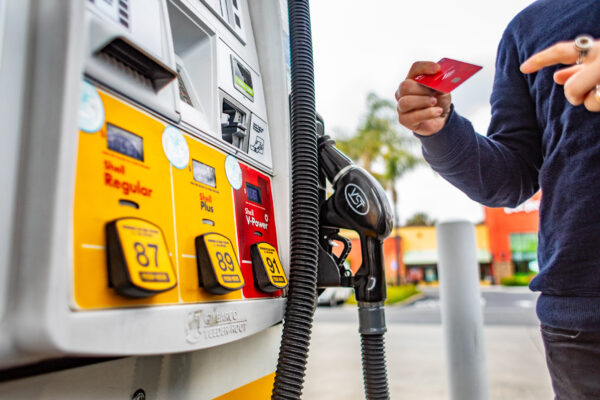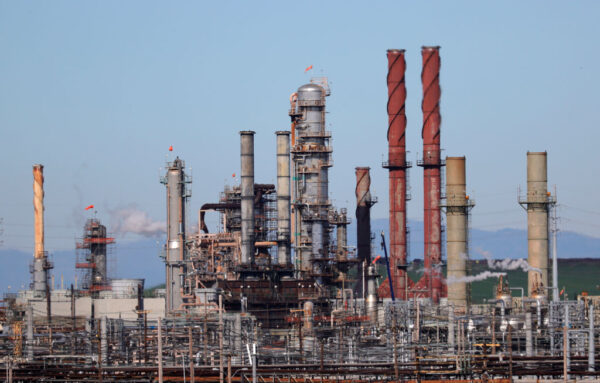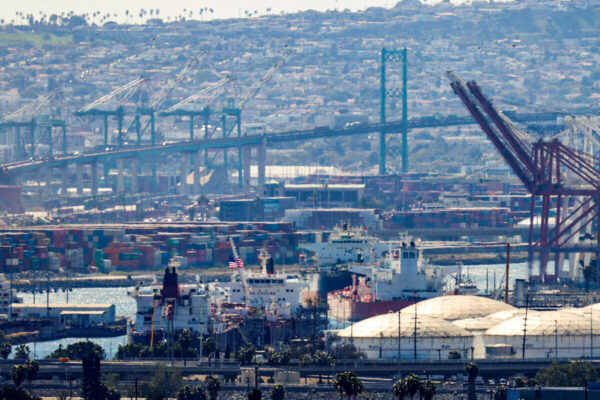 California Gov. Gavin Newsom, a Democrat, speaks to reporters during a visit the Antioch Water Treatment Plant in Antioch, Calif., on Aug. 11, 2022. (Justin Sullivan/Getty Images)
California Gov. Gavin Newsom, a Democrat, speaks to reporters during a visit the Antioch Water Treatment Plant in Antioch, Calif., on Aug. 11, 2022. (Justin Sullivan/Getty Images)
By October 5, 2022 Updated: October 5, 2022. Media: The Epoch Times.
Gov. Gavin Newsom is calling on state lawmakers to impose a new tax on oil companies as gas prices continue to escalate in California, but industry experts say the tax would add more cost for consumers and could destabilize oil businesses.
Prices at the pump in the Golden State are the highest in the nation, climbing again this week to an average of $6.41 per gallon Oct. 4, according to the Automobile Club of Southern California.
The governor claimed Sept. 30 that refinery issues and the state’s high gas taxes were not to blame.
“Gas prices in California have increased by a record 84 cents per gallon in just over one week,” Newsom said in a fiery video message. “It just doesn’t add up. And oil companies, they provide no explanation.”
The state’s Energy Commission sent a letter the same day to refinery executives asking them to explain the price increases, pointing to lower-than-normal inventories of gasoline as a possible contributing factor.
Newsom accused the oil refineries and companies of profiting from the situation.
“The fact is, they’re ripping you off,” Newsom said in a Sept. 30 statement. “Their record profits are coming at your expense. We’re not going to stand by while greedy oil companies fleece Californians.”
 A man pays for gas in Irvine, Calif., on April 1, 2022. (John Fredricks/The Epoch Times)
A man pays for gas in Irvine, Calif., on April 1, 2022. (John Fredricks/The Epoch Times)
Newsom said he is working with legislators to propose charging oil companies a “windfall profits tax” on earnings above a set amount each year. Revenue generated from the tax would be refunded to taxpayers, according to the statement.
He also asked the California Air Resources Board, a state regulatory agency, to allow retailers to start using less-expensive winter-blend gasoline early this year. The state required retailers to sell an emissions-reducing summer-blend fuel, which adds as much as 25 cents per gallon.
The early transition should increase supply and save consumers the extra cost per gallon, according to the statement.
Record Prices Caused by Refinery Shortage, High Gas Tax
Consumers were paying record prices for fuel this week in Los Angeles as the average price reached $6.49 Oct. 4.
In Orange County, prices hit a new record at $6.45 per gallon on average. The average price has risen in 14 of the past 15 days in the county, increasing by $1.05. This is nearly 51 cents more than last week, $1.22 higher than one month ago, and $2.07 greater than a year ago.
Prices began to escalate after four large refineries in California shut down in September for planned and unplanned maintenance, cutting off much of the state’s gas supply.
 A view of the Chevron refinery in Richmond, Calif., on Nov. 17, 2021. (Justin Sullivan/Getty Images)
A view of the Chevron refinery in Richmond, Calif., on Nov. 17, 2021. (Justin Sullivan/Getty Images)
This has forced retailers to compete with other states and countries for oil. Prices are rising drastically as a result, according to oil industry experts.
Despite record gas prices, California increased its gas tax rate again in July. The state now adds 53.9 cents of tax per gallon—the highest in the nation.
Windfall Tax Might Drive Up Consumer Prices
The windfall tax would further increase gas prices, the Western States Petroleum Association told The Epoch Times.
“The Governor and the Legislature fail to understand time and time again that their policy decisions have a major impact at the pump,” said Kara Greene, spokeswoman for the association. “Governor Newsom has the ability to quickly lower gas prices by suspending gas taxes and his regulatory program costs, but he’s deliberately chosen to make another policy decision to further increase costs on consumers through yet another tax on fuel.”
Also, targeting the industry with a windfall tax for making money during profitable times and not providing relief during downturns seems unfair, one industry expert and lawmaker in the Permian Basin between Texas and New Mexico—a region that supplies 40 percent of the country’s oil production—told The Epoch Times.
“[The proposed tax] just doesn’t make the playing field consistent,” New Mexico State Representative Greg Nibert said. Nibert is also an oil and gas attorney and a member of the Energy Council, a nonpartisan legislative forum for energy-related policies in the southwest.
 Traffic flows along San Diego roadways in San Diego, Calif., Aug. 31, 2006. (Sandy Huffaker/Getty Images)
Traffic flows along San Diego roadways in San Diego, Calif., Aug. 31, 2006. (Sandy Huffaker/Getty Images)
Such tax would also destabilize oil businesses, he said.
“It doesn’t account for the bad times, as well as the good times,” he said. “The oil industry can be really good for a short time and then it can be really bad for a short time. Right now, it’s really good. But every oil company knows that they need to build their war chest because, in a few years, they’re going to see it go down.”
The oil industry historically cycles through market extremes. One notable downturn occurred at the onset of the COVID-19 pandemic when much of the world was locked down.
On April 20, 2020, oil producers had to pay customers to take oil off their hands because the West Texas Intermediatecrude oil contract dropped 306 percent—the largest one-day drop since 1983—and settled at negative $37.63 a barrel on the New York Mercantile Exchange, according to financial news website Market Watch.
 Oil pumpjacks operate at dusk Willow Springs Park in Long Beach, Calif., on April 21, 2020, a day after oil prices dropped to below zero as the oil industry suffers steep falls in benchmark crudes due to the ongoing global coronavirus pandemic. (Apu Gomes/AFP via Getty Images)
Oil pumpjacks operate at dusk Willow Springs Park in Long Beach, Calif., on April 21, 2020, a day after oil prices dropped to below zero as the oil industry suffers steep falls in benchmark crudes due to the ongoing global coronavirus pandemic. (Apu Gomes/AFP via Getty Images)
“California is in a pretty interesting place energy-wise,” he said. “You have a state that politically does not want fossil fuels, and you have a huge demand for fossil fuels. And, you have limited infrastructure to get oil to your refineries,” he added.
To meet the need, California has been importing more than half of its oil supply from foreign countries since 2012—except for 2020, the first year of the COVID-19 lockdown—according to the state Energy Commission.
In 2021, the state imported nearly 300,000 barrels—filling 56 percent of the total supply—from a list of countries topped by Ecuador, Saudi Arabia, Iraq, and Brazil. Domestically, the state produced 151,300 barrels of oil—about 29 percent—and imported another 78,100—15 percent—from Alaska last year, according to the commission.





























































































